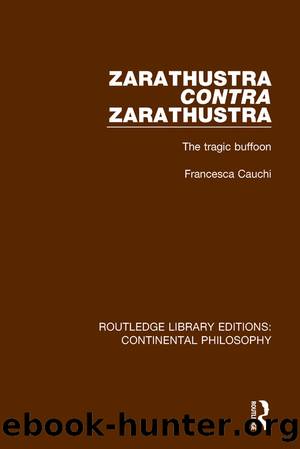Zarathustra Contra Zarathustra by Cauchi Francesca;

Author:Cauchi, Francesca; [Cauchi, Francesca]
Language: eng
Format: epub
ISBN: 9781138063150
Publisher: TaylorFrancis
Published: 2017-07-20T00:00:00+00:00
Fear of âthe beast withinâ and the loneliness of those who inquire and seek after a scientific framework within which to cage the conquered instinctual beast, bind the âdreamy wandererâ to the âsleeping dog [â¦] lying in the sunâ. Whether, as in the latter case, one blinds oneself to the glaring truth â âthe blindness of the blind man and his seeking and groping shall yet bear witness to the power of the sun into which he gazedâ (Z.II.8) â or, as in the former, averts oneâs gaze and dreams of distant things, one is dealing in the same counterfeit currency of idealism (GM.III.26).
Wissenschaft (science) and gewissenhaft (conscientious) share more than a merely formal resemblance; etymologically, they are rooted in the same infernal element â wissen (to know). Scholastic, scientific, and philosophical seekers after knowledge â âthe conscientious of spiritâ â are alike constrained by an âunconditional will to truthâ (GM.III.24): âIt is still a metaphysical faith that underlies our faith in science â and we enlightened men of today, we godless men and anti-metaphysicians, we, too, still take our flame from the fire ignited by a millennia-old faith, the Christian faith, which was also Platoâs faith, that God is truth, that truth is divineâ (ibid.). But what is the precise nature of this âtruthâ after which the conscientious of spirit thirst? If we take the method of âbackward inferenceâ one step further â that is, âfrom the ideal to those who need itâ (GS.V.370) â we will find that a âmetaphysical faithâ arises out of a need for âmetaphysical comfortâ (BT.7). In other words, the âtruthâ which the conscientious of spirit need is a âpicturesqueâ (A.13) one: they need absolute reassurance that âdespite all changes of appearance, life is at bottom indestructibly powerful and joyfulâ (BT.7). But, as Zarathustra teaches, âall deep knowledge flows coldâ, and the ice-cold, âinnermost wells of the spiritâ (Z.II.8) extinguish all too soon the metaphysical fire. Once it is discovered that the indestructibly powerful source of life is will to power (âThe world is will to power â and nothing besidesâ KSA.11.611), and that endless flux is the distressing manifestation of this will (Z.III.12.8), the value of truth is immediately called into question. âA life-threatening, destructive principle [â¦] âwill to truthâ [â¦] that could be a concealed will to deathâ (GS.V.344), compels one to ask: at what price truth? In a bid for survival, the conscientious of spirit begin to turn truth on its head, and an inexorable will to truth gradually and paradoxically mutates into an equally compelling will to artifice, illusion, and fraudulent idealism.195 âFreez[ing] to death on the ice of knowledgeâ (Z.III.6), the conscientious of spirit are those most in need of anæsthetizing idealism: this âfieriest water of the spiritâ (UM.III.26) is the nihilistic but life-preserving intoxicant to which those benighted by enlightenment and frozen by fire are addicted.
âAll great thingsâ, writes Nietzsche, âbring about their own destruction through an act of self-transcendence (Selbstaufhebung)â (GM.III.27), and just as doctrinaire Christianity destroyed itself by its own moral dogmatism (ibid.
Download
This site does not store any files on its server. We only index and link to content provided by other sites. Please contact the content providers to delete copyright contents if any and email us, we'll remove relevant links or contents immediately.
The remains of the day by Kazuo Ishiguro(8956)
Tools of Titans by Timothy Ferriss(8354)
Giovanni's Room by James Baldwin(7308)
The Black Swan by Nassim Nicholas Taleb(7092)
Inner Engineering: A Yogi's Guide to Joy by Sadhguru(6779)
The Way of Zen by Alan W. Watts(6584)
Asking the Right Questions: A Guide to Critical Thinking by M. Neil Browne & Stuart M. Keeley(5745)
The Power of Now: A Guide to Spiritual Enlightenment by Eckhart Tolle(5736)
The Six Wives Of Henry VIII (WOMEN IN HISTORY) by Fraser Antonia(5490)
Astrophysics for People in a Hurry by Neil DeGrasse Tyson(5172)
Housekeeping by Marilynne Robinson(4428)
12 Rules for Life by Jordan B. Peterson(4293)
Double Down (Diary of a Wimpy Kid Book 11) by Jeff Kinney(4254)
The Ethical Slut by Janet W. Hardy(4235)
Skin in the Game by Nassim Nicholas Taleb(4228)
Ikigai by Héctor García & Francesc Miralles(4228)
The Art of Happiness by The Dalai Lama(4118)
Skin in the Game: Hidden Asymmetries in Daily Life by Nassim Nicholas Taleb(3983)
Walking by Henry David Thoreau(3943)
